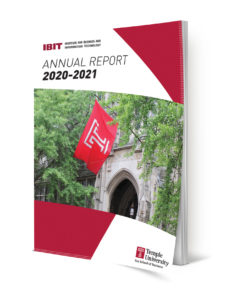It is my pleasure to present the 2020-21 annual report of the Institute for Business and Information Technology (IBIT), Temple University. View online or download. We are very proud of the IBIT partnership with nationally recognized firms and the IT advisory board.
Sincerely,
Munir Mandviwalla
Executive Director


 Lab-scale Testbed for Mixed Human-Autonomous Vehicle Traffic Research
Lab-scale Testbed for Mixed Human-Autonomous Vehicle Traffic Research Employee Professional Development and Engagement
Employee Professional Development and Engagement

 Eileen Teti, owner of Hair Way to Beauty, needed a way to stay connected to her clients during the pandemic. Temple students swooped in to create a new website for her that’s easy to navigate.
Eileen Teti, owner of Hair Way to Beauty, needed a way to stay connected to her clients during the pandemic. Temple students swooped in to create a new website for her that’s easy to navigate.


